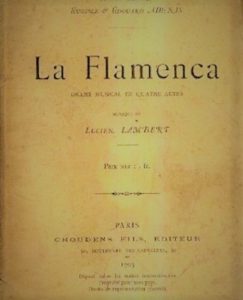
Lamberts la-Flamenca
*Lucien Lambert, Jr. was born on this date in 1858. He was a Black pianist and composer of American Creole descent.
Lucien-Leon Lambert was the son of New Orleans composer Charles Lucien Lambert, who married a French woman and emigrated from the U.S. in 1854. Lambert, Jr. studied music with his father, Theodore Dubois, and Jules Massenet. After completing his studies, he worked as a musician and composer. In 1860, his father moved the family to Rio De Janeiro, where he became part of the Brazilian National Institute of Music.
While in Rio, Fil studied under his Pere and French Creole composer Louis Moreau Gottschalk. However, Fil returned to France around 1870 to make his mark as a musician and composer. While Fil was pursuing his dreams, in 1896, Charles died in Rio, never returning to France or New Orleans again. His Promethee Enchaine won the Prix Rossini in 1885. After a successful career in France, Lambert relocated to Portugal, where he worked as a pianist in the Royal Court of Portugal, along with his uncle Sidney Lambert.
In the 1870s, he was recognized by King Dom Pedro for innovations in music. In 1905, he recorded three wax cylinders for the Pathe Company in Lisbon, which was thought to be the first classical music recordings made by a performer of African descent. His family was noted for talent in music and gained international acclaim. Lambert is sometimes listed as Lucien Lambert fils (son), and his works are often confused with his father’s. His papers are in the Bibliotheque Nationale in Paris. He died on January 21, 1945.
To Become a musician or Singer
To Become a Conductor or Composer